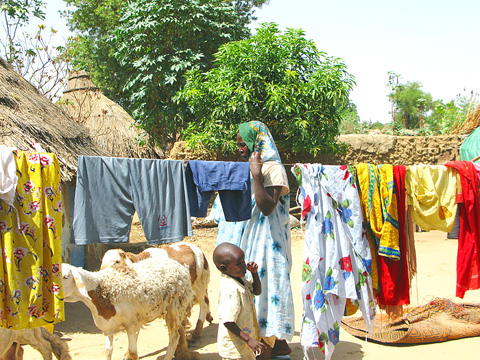Khamisa Tafaela is frantic about 10-month-old son Nabil Abdulkarim, crying miserably in her lap. She has already lost one child to the same vomiting and diarrhea in the same Darfur camp.
Painstakingly, she squeezes gooey paste into his reluctant mouth from the energy-meal sachets provided after a doctor’s visit but Nabil writhes and twists his head away, uninterested, his tiny thin legs dangling off her lap.
“Last night he got worse. He cried all night. I had one child with the same problems and the child died three years ago,” said Khamisa, bouncing a wailing Nabil up and down.

PHOTO: AFP
She doesn’t know why he fell ill, but Ardamata, a sprawling expanse of huts providing little reprieve from the burning sun or torrential seasonal rains, is a difficult place to live for some 27,000 Darfurians made homeless by war.
In the four to five years that she, her bricklayer husband and five children have lived in the camp in West Darfur, life has been grim.
She now has to contend with a second month of halved food rations from the international community, although special nutritional programs for the under fives such as Nabil, who are considered most at risk, have not been affected.
Camp elders, all men, are beginning to blame what they consider the all-powerful UN for letting them go hungry five years into the war.
The World Food Programme says food cuts are a forced necessity. They have plenty of food in the warehouses but massively deteriorated security, banditry, hijackings and kidnappings makes it simply too dangerous to deliver.
The UN agency expects to feed 1.2 million people in Darfur, but since last month’s rations of cereals, pulses and sugar have been cut by 50 percent, and the daily kilo calorie allowance per person slashed by 40 percent from 2,156 to 1,242.
Officials consider June to October “hunger season” — when food stores are running low and next year’s harvest has yet to be gathered.
Last August, the acute malnutrition rate in Darfur among under fives was 16.1 percent, above the emergency threshold of 15 percent.
“Before, the food lasted 25 days. Now only 10 days. We do get some food from the market, but sometimes we go without, we reduce our meals and sometimes we sleep without food. We have no option,” one woman said.
“At one point you even cry. You see a problem and you can’t help these people,” said one African expatriate worker in a camp in southern Darfur.

With much pomp and circumstance, Cairo is today to inaugurate the long-awaited Grand Egyptian Museum (GEM), widely presented as the crowning jewel on authorities’ efforts to overhaul the country’s vital tourism industry. With a panoramic view of the Giza pyramids plateau, the museum houses thousands of artifacts spanning more than 5,000 years of Egyptian antiquity at a whopping cost of more than US$1 billion. More than two decades in the making, the ultra-modern museum anticipates 5 million visitors annually, with never-before-seen relics on display. In the run-up to the grand opening, Egyptian media and official statements have hailed the “historic moment,” describing the

‘CHILD PORNOGRAPHY’: The doll on Shein’s Web site measure about 80cm in height, and it was holding a teddy bear in a photo published by a daily newspaper France’s anti-fraud unit on Saturday said it had reported Asian e-commerce giant Shein (希音) for selling what it described as “sex dolls with a childlike appearance.” The French Directorate General for Competition, Consumer Affairs and Fraud Control (DGCCRF) said in a statement that the “description and categorization” of the items on Shein’s Web site “make it difficult to doubt the child pornography nature of the content.” Shortly after the statement, Shein announced that the dolls in question had been withdrawn from its platform and that it had launched an internal inquiry. On its Web site, Le Parisien daily published a

China’s Shenzhou-20 crewed spacecraft has delayed its return mission to Earth after the vessel was possibly hit by tiny bits of space debris, the country’s human spaceflight agency said yesterday, an unusual situation that could disrupt the operation of the country’s space station Tiangong. An impact analysis and risk assessment are underway, the China Manned Space Agency (CMSA) said in a statement, without providing a new schedule for the return mission, which was originally set to land in northern China yesterday. The delay highlights the danger to space travel posed by increasing amounts of debris, such as discarded launch vehicles or vessel

RUBBER STAMP? The latest legislative session was the most productive in the number of bills passed, but critics attributed it to a lack of dissenting voices On their last day at work, Hong Kong’s lawmakers — the first batch chosen under Beijing’s mantra of “patriots administering Hong Kong” — posed for group pictures, celebrating a job well done after four years of opposition-free politics. However, despite their smiles, about one-third of the Legislative Council will not seek another term in next month’s election, with the self-described non-establishment figure Tik Chi-yuen (狄志遠) being among those bowing out. “It used to be that [the legislature] had the benefit of free expression... Now it is more uniform. There are multiple voices, but they are not diverse enough,” Tik said, comparing it